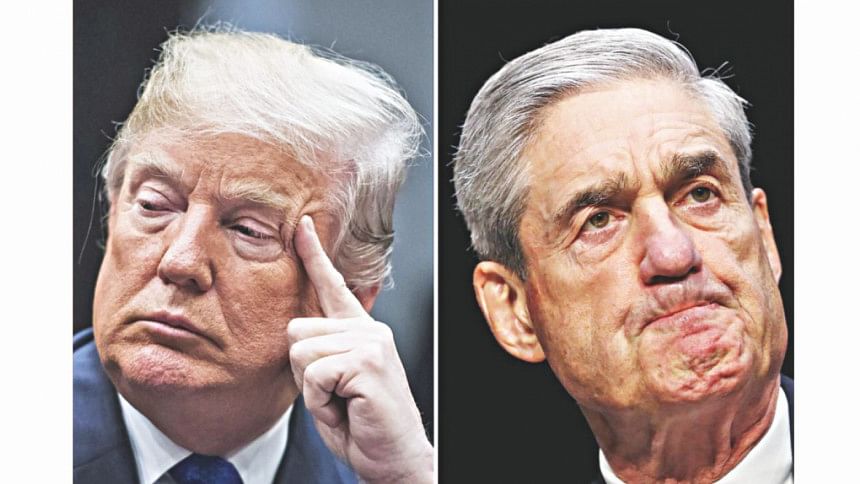The Mueller Bait and Switch

The American people should have known that something was awry when President Donald Trump's attorney general, William Barr, announced on Friday, March 22, that he had received special counsel Robert Mueller's report and would provide a summary of its findings to certain congressional leaders over the weekend.
We should have asked: Why Barr's summary and not Mueller's? Presumably, Mueller had attached one to his report. It turned out there was a propagandistic reason for this unusual arrangement: Barr issued the best possible interpretation of Mueller's report—from the president's standpoint—including perhaps even a twist on what Mueller had said and intended. This allowed the president and his backers to propagate and celebrate what Mueller didn't say: that the report's conclusions were a "total exoneration" of Trump. In fact, even Barr's brief summary, quoting Mueller's report, said, "While this report does not conclude that the President committed a crime, it also does not exonerate him."
A version of Mueller's report for release is supposedly in the works—scrubbed of classified material, grand jury testimony (which is always supposed to remain secret), or information on ongoing investigations. No one exactly knows when it will appear. Meanwhile, Trump and his boosters, including most of the Republican Party, get to carry on about the president's supposed total exoneration, implanting the idea in the mind of much of the public. As is often the case with Trump's presidency, the truth will have a hard time catching up.
Barr's independence had already been in question. Last November, Trump finally rid himself of his first attorney general, Jeff Sessions, with whom he'd been furious for (properly) recusing himself from the special counsel's investigation into Russia's interference in the 2016 election, whether the Trump campaign had cooperated with Russia, and whether Trump had obstructed justice by impeding the investigation. Months earlier, in June 2018, Barr appeared to apply for the job by sending a long, unsolicited document to the Justice Department criticising Mueller's inquiry into whether Trump had obstructed justice as "grossly irresponsible," "fatally misconceived," and "potentially disastrous."
Democrats, journalists, and others are anxious to see Mueller's actual report so that they can read what Mueller weighed as reasons for saying that the president obstructed justice, even if in the end he decided to not charge him for it. And they want to see, if it's in the report, why Mueller decided not to be the one to decide whether or not to charge Trump—a prosecutor's job. Most legal observers assume that Mueller was leaving the decision to Congress, not to the attorney general.
Several experts speculated that Mueller made this choice because of a Justice Department rule—more weakly grounded than is generally believed—that a sitting president cannot be indicted. (This creates a strong incentive for a president to remain in office as long as possible.) Barr's letter said that "most" of Trump's attempts to obstruct justice were publicly known—thus fuelling intense curiosity about what unknown attempts there might be. In any event, US law sets a high bar for prosecuting obstruction of justice: the person has to be known to have had "criminal intent," and, as in any conviction, to have done so "beyond a reasonable doubt."
Barr may well have used another formulation—possibly the same one as Mueller—in sparing Trump and his aides a charge of conspiring with Russia to help them win the 2016 election: they hadn't cooperated or collaborated with the Russian "government" (something the Mueller report did confirm). The problem is that the numerous known contacts between campaign officials and Russian intelligence agents and oligarchs (who owe their wealth to the Kremlin)—102 in at least 28 meetings, by one count—might not count as cooperation with Russia's "government."
Further doubt about this distinction stems from the fact that various Trump aides have been convicted of lying about such contacts. These include Trump's former national security adviser, Michael Flynn, who lied about his conversations with the Russian ambassador during the transition (probably about lifting sanctions that President Barack Obama had imposed on Russian businesses). Moreover, the president's son, Donald Trump, Jr., along with other top campaign officials, met in Trump Tower with a Russian intelligence agent with ties to the Kremlin who had promised "dirt" on Clinton.
It had been widely expected that Trump's son would face indictment as well—even Donald, Jr., had said so—but Barr's announcement ruled out further prosecutions. Another prominent escapee from the special counsel's hammer was Trump's son-in-law, Jared Kushner, who is widely believed to have used his White House role, especially in foreign policy (in which he'd had no experience), to attend to his family's need for funds to pay off a huge real-estate debt.
Trump himself is still vulnerable to investigations initiated by or handed off to federal and state prosecutors outside of Washington. The US Attorney's Office for the Southern District of New York and the New York state attorney general, for example, are investigating the collection and distribution of unusually large funds for the presidential inauguration, the Trump family business and foundation (which has been forced to shut down), the payment of hush money before the election to keep a porn star quiet about an affair with Trump, Trump's taxes, and other issues. There can be little doubt from his own behaviour that Trump has somehow been compromised by Putin, in part because of Trump's eagerness to build a hugely lucrative Trump Tower in Moscow. Discussions about the project were ongoing during his election campaign, even as Trump was telling the public that he had no business with Russia.
Rather than simply exult in his ostensible vindication, Trump has been playing the victim and vowing vengeance. He has called for an investigation into what he calls "an illegal takedown that failed," by "the other side," which should be "looked at." The Trump re-election campaign sent a memo to television producers advising caution about booking certain lawmakers and others who had said that the Trump campaign had colluded with Russia. Journalists, too, were targeted for revenge. And Hillary Clinton, about whom Trump still obsesses, will continue to be a target. Trump's base loves that, and the base is critical for Trump's re-election, which now does not seem as out of the question as it did before.
Elizabeth Drew is a Washington-based journalist and the author, most recently, of Washington Journal: Reporting Watergate and Richard Nixon's Downfall.
Copyright: Project Syndicate, 2019.
www.project-syndicate.org
(Exclusive to The Daily Star)





Comments